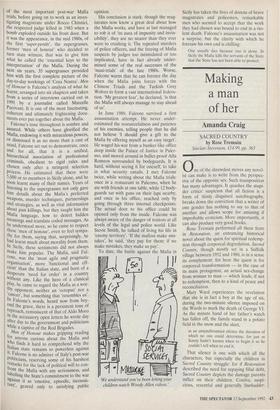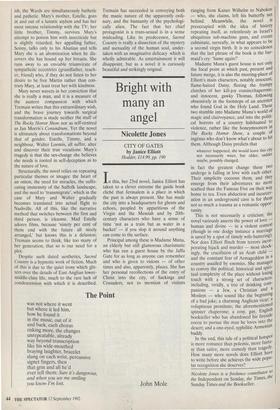Making a man of her
Amanda Craig
SACRED COUNTRY by Rose Tremain Sinclair-Stevenson, £14.99, pp. 363 0 ne of the shrewdest moves any novel- ist can make is to write from the perspec- tive of the opposite sex. Such transposition has many advantages. It quashes the stupi- der critics' suspicion that all fiction is a form of thinly disguised autobiography, breaks down the conviction that a writer of one gender has nothing to say to that of another and allows scope for amusing if improbable eroticism. More importantly, it can also produce very good books.
Rose Tremain performed all these feats in Restoration, an entrancing historical novel about the quest for spiritual redemp- tion through corporeal degredation. Sacred Country, though mostly set in a Suffolk village between 1952 and 1980, is in a sense its complement: for here the quest is for corporeal transformation — in the case of its main protagonist, an actual sex-change from woman to man — which leads, if not to redemption, then to a kind of peace and reconciliation.
Mary Ward experiences the revelation that she is in fact a boy at the age of six, during the two-minute silence imposed on the Wards to mark the death of George VI. As the minute hand of her father's watch has fallen off, the family stand in a potato field in the snow and the sleet,
in an unsynchronised silence the duration of which no one could determine, for just as Sonny hadn't known when to begin it so he couldn't tell when to end it.
That silence is one with which all the characters, but especially the children in Sacred Country struggle: for if Restoration described the need for repaying filial debt, Sacred Country depicts the damage parents inflict on their children. Costive, suspi- cious, resentful and generally Starkadder-
ish, the Wards are simultaneously bathetic and pathetic. Mary's mother, Estelle, goes in and out of a lunatic asylum and has her most intense relationship with the TV; her little brother, Timmy, survives Mary's attempt to poison him with insecticide but is slightly retarded; her appalling fattier, Sonny, talks only to his Alsatian and tells Mary she is an abomination when he dis- covers she has bound up her breasts. She runs away to an enviable triumvirate of sympathetic eccentrics (grandfather, teach- er, friend) who, if they do not listen to her desire to be free Martin rather than con- trary Mary, at least treat her with kindness.
Mary never wavers in her conviction that she is really a man, and it is a measure of the austere compassion with which Tremain writes that this extraordinary wish, and the brave journey towards surgical transformation is made neither the stuff of The Rocky Horror Show nor as self-centred as Jan Morris's Conundrum. Yet the novel is ultimately about transformations beyond that of gender. Estelle, Timmy, and a neighbour, Walter Loomis, all suffer, alter and discover their true vocations: Mary's tragedy is that the sex-change she believes she needs is rooted in self-deception as to the nature of love.
Structurally, the novel relies on repeating particular themes or images: the heart of an onion, the need for miracles, the suffo- cating immensity of the Suffolk landscape, and the need to `transmigrate', which in the case of Mary and Walter gradually becomes translated into actual flight to Nashville. All of this, like the narrative method that switches between the first and third person, is irksome. Mad Estelle adores films, because 'ninety per cent of them end with the future all nicely arranged,' but knows this is a delusion; Tremain seems to think, like too many of her generation, that so is our need for a plot.
Despite such dated aesthetics, Sacred Country is a hypnotic work of fiction. Much of this is due to the quiet irony which glit- ters over the details of East Anglian lower- middle-class life, much to the rare lack of condescension with which it is described. Tremain has succeeded in conveying both the manic nature of the apparently ordi- nary, and the humanity of the psychologi- cally alien. The fact that her chief protagonist is a trans-sexual is in a sense misleading. Like its predecessor, Sacred Country is really a dissection of the mystery and asexuality of the human soul, under- taken with an imaginative delicacy which is wholly admirable. As entertainment it will disappoint, but as a novel it is curiously beautiful and strikingly original.



































































 Previous page
Previous page